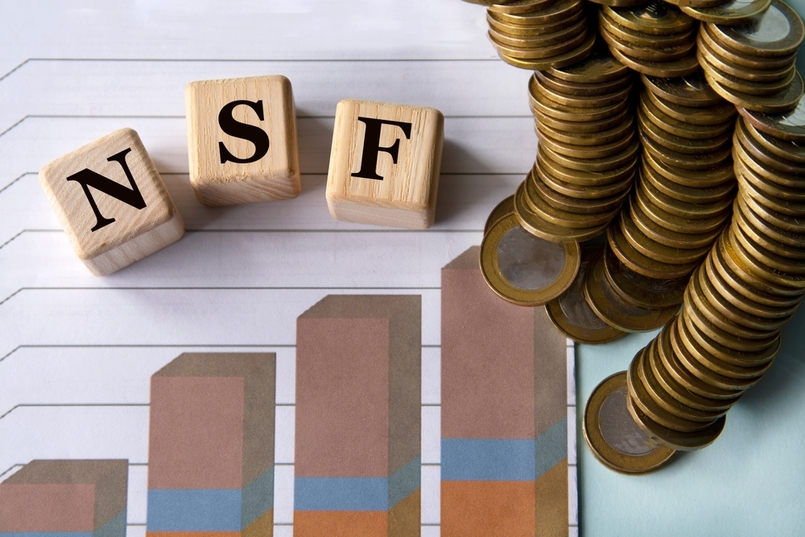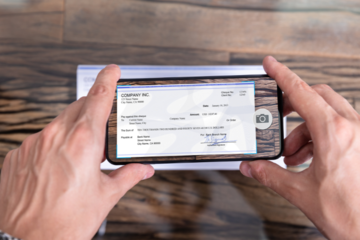While most people have heard of overdraft fees, they might not know what an NSF fee is. NSF stands for "non-sufficient funds". NSF Fees and overdraft fees are different. We have compiled information to explain what the term "non-sufficient funds" mean, how much NSF fees typically cost, the difference between non-sufficient funds and overdrafts, and how to avoid unnecessary bank fees.
What Are Non-Sufficient Funds?
Sometimes a person will think they have enough money in their checking account to cover a bill or expenditure when they do not. Having non-sufficient funds is when there is not enough money in a checking account to cover a check or Automated Clearinghouse (ACH) Transaction. This is commonly referred to as a “bounced” check.
Examples of activities that can trigger NSF fees are:
- Writing a check that is a larger amount than the checking account balance.
- Making an electronic payment that is more than the available funds in the checking account.
- Setting up an automatic payment and not having enough funds to cover it when it is debited from the account.
How Much Is a Typical NSF Fee?
Banks typically charge fees for non-sufficient fund transactions. Fees discourage account holders from making transactions when there is not enough money in the checking account to cover them.
According to the FDIC, NSF fees average $35 per transaction. These fees are set by each individual bank, so they may be lower or higher, depending on the financial institution’s fee structure. Customers can proactively view NSF fee costs by reading their Account Agreement.
NSF fees are usually fixed and are not variable based on the amount of the transaction, or how much the checking account is short. In other words, a $30 bounced check typically incurs the same NSF fee as a $2000 bounced check.
Overdraft Fees vs. Non-Sufficient Funds Fees
Overdraft fees and NSF fees are similar because they both stem from a consumer not having enough funds in their checking accounts to cover a transaction. However, they are not the same thing.
When an account holder overdrafts an account, the transaction still goes through. The bank covers the transaction and then charges a fee to the account holder for over drafting their account. A consumer may need to activate or accept overdraft protection on their account to receive this feature.
In contrast, when an account holder attempts a transaction that results in non-sufficient funds, it is not processed and may be sent back to the processor. In an NSF situation, the processor of the payment will be aware the consumer did not have the funds to cover the transaction.
3 Ways to Avoid NSF Fees
Consumers should attempt to avoid unnecessary fees when possible. Here are 3 ways to avoid NSF fees.
- Monitor bank balances. Taking a hands-on approach to managing finances is one of the easiest ways to avoid NSF fees. Stay within a realistic budget and consistently monitor bank balances and transactions to ensure the account is not close to zero. Downloading a bank’s mobile app makes this easier.
- Sign up for direct deposit. Allowing employers to direct deposit paychecks gives consumers access to their funds earlier than traditional ways of deposit. Available funds help avoid NSF fees.
- Opt into overdraft protection. Signing up for overdraft protection is an easy way to avoid NSF fees if the account does run short. Understanding NSF fees and how they differ from overdraft fees is helpful in avoiding costly, unnecessary banking charges. Wisely managing checking accounts is a smart money move that protects the consumer’s budget and minimizes the risk of overpaying for banking services.
Do you need a direct loan to cover unforeseen expenses? Take advantage of our easy application process today.
FAQs
Why did I get Charged an NSF Fee?
-You were likely charged an NSF fee because there were not enough funds in your account to cover a recent transaction.
How do I Get Rid of an NSF Fee?
-Consult with the bank directly to request a refund. Be ready to provide the day and time the fee was applied to your account, and why there were insufficient funds in your account at the time of transaction.
Sources
- FDIC: Overdraft and Account Fees
- How many times will a bank allow an NSF check to be resubmitted?
- Consumers on course to save $1 billion in NSF fees annually, but some banks continue to charge these fees
- Overdraft Fees Vs. NSF Fees: What's The Difference? - Forbes Advisor
- 7 Key Benefits Of Mobile Banking │ Bankrate



